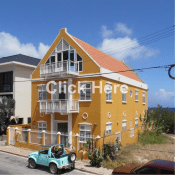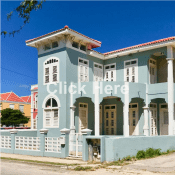Study in Curacao
About Curacao
Curaçao is a Lesser Antilles island in the southern Caribbean Sea and the Dutch Caribbean region, about 65 km (40 mi) north of the Venezuelan coast. It is a constituent country (Dutch: land) of the Kingdom of the Netherlands.The country was formerly part of the Curaçao and Dependencies colony (1815–1954) and is now formally called the Country of Curaçao (Dutch: Land Curaçao; Papiamento: Pais Kòrsou); it includes the main island of Curaçao and the uninhabited island of Klein Curaçao (“Little Curaçao”). Curaçao has a population over 160,000 in an area of 444 km2 (171 sq mi) and its capital is Willemstad.
Before the dissolution of the Netherlands Antilles on 10 October 2010, Curaçao was administered as the “Island Territory of Curaçao”(Dutch: Eilandgebied Curaçao, Papiamento: Teritorio Insular di Kòrsou), one of five island territories of the former Netherlands Antilles.
CURRENCY
Curaçao currency is the Antillean guilder (also called the florin), which is abbreviated as Nafl but U.S. dollars circulate freely, so it is possible to get by using only American dollars or credit cards. Euros are accepted at some hotels and restaurants, but unlike U.S. dollars, they do not circulate freely. Visit www.centralbank.an for more information on the current exchange rates. Major credit cards are accepted almost everywhere on the island. ATM machines can be found all over the island at major population centers and at the airport. To recognize an ATM machine, look for the signs “Bankomatiko” or “Geldautomaat.” Most ATMs offer the option to withdraw in local currency or US dollars.
Education
The Education System of Curacao is modeled on Dutch Education System.Curacao offers education in public schools, private schools and parochial schools. Adding to this, primary education is compulsory from the age of 6 with duration of 6 years. This is followed by 5 years of secondary education. There are many medical schools in Curacao they follow American pattern of education. International students from Asia, Canada , America study MD (MBBS) course in Curacao with progression to USA.
GOVERNMENT
The government of Curaçao takes place in a framework of a parliamentary representative democratic country. The Prime Minister is the head of government. Executive power is exercised by the government. Legislative power is vested in both the government and parliament. The judiciary is independent of the executive and the legislature. Convicted felons are held at the Curaçao Centre for Detention and Correction prison.[citation needed] Curaçao has full autonomy on most matters, with the exceptions summed up in the Charter for the Kingdom of the Netherlands under the title “Kingdom affairs”.
CLIMATE
Located in the tropics, just 12° north of the Equator, Curaçao has a warm, sunny climate year round. The average temperature is about 27° C (in the mid-80s F). Cooling trade winds blow constantly from the east, picking up in the spring months. The rainy season, which is between October and February, is usually marked by short, occasional showers, mostly at night, and continued sunny weather during the day. Total annual rainfall averages only 570 mm (22 inches).
PUBLIC TRANSPORTATION
You can easily move about the island by bus. Curaçao offers two kinds of public transportation: the large buses, which are called ‘Konvooi’, go for a longer distance, and on most urban routes you will find vans (max. 9 p.) called ‘bus’ (they have BUS on their registration plates). The bus routes cover most parts of the island, and can bring you to beaches, shopping areas, and parks.
Curaçao has a public transportation system (buses), but some of our students decide to purchase (or rent) cars, motorcycles, or bicycles in order to get to and from the University. Given that Curaçao is 275.8 sq. km (171.4 sq. miles) large, having a personal means of transportation, although not necessary, may allow you to be better equipped to explore the island.
To drive in Curaçao, a valid driver’s license is necessary. An international driver’s license is not required. Driving takes place on the right-hand side of the road. At intersections and traffic circles, yield to traffic coming from your right unless signs indicate otherwise. At all T-crossings, through-going traffic has priority. The speed limit is 45 km/hour in town and residential areas, and 60¬-80 km/hour outside the city and on the four-lane Ring Road. Most gas stations are full service; a few are open 24 hrs.
SAFETY
Curaçao is one of the best and safest islands in the Caribbean according to Business Insider, a popular US-based magazine. This fact allows for a harmonious and peaceful living environment. This is thanks to the combined efforts of the Curaçao Police Department, Politur (branch of the police force dedicated to the protection of tourists), Curaçao Fire Department, and Curaçao’s Emergency Services. However, use common sense and take all standard safety precautions.
WATER
Not only is Curaçao water safe to drink, it is of the finest quality. Around 1890, American wind turbines were imported to Curaçao for irrigation of the land. In 1928, a seawater distillery for production of drinking water was put into production. This Curaçao distillery, now known as Aqualectra, produces water of excellent quality. It is soft, contains no chloride and little calcium, is tasteless and odorless, and has a good bacteriological composition.
ELECTRICITY
Although both 110 and 220 electrical outlets can be found in Curaçao, 110 V is the most common throughout. Student from Europe will need an adapter plug for their round-pronged plugs. These can be found anywhere on the island, and most hotels keep them in stock and in the rooms as well. Only dual-voltage appliances from Europe can be used on the island.
PUBLIC HOLIDAYS IN CURAÇAO
SMUFOM recognizes all local national holidays.
New Year’s Day (January 1st)
Carnival Day (Dates Vary)
Good Friday (Dates Vary)
Easter (Dates Vary)
King’s Day (April 27th)
Labor Day (May 1st)
Ascension Day (Dates Vary)
Flag Day (July 2nd)
Curaçao Day (October 10th)
Christmas Day (December 25th)
Second Day of Christmas (December 26th)
COMMUNICATION
Curaçao’s international code is +5999; there are no internal area codes. International roaming is available in Curaçao, so you will be able to make and receive calls outside the coverage area.
ACTIVITIES
Curaçao is a tourist’s dream. You will always have something to do on the island. With beautiful beaches, restaurants, nightclubs, bars, hotels, shopping malls, scuba diving, snorkeling, and many other activities, you will never be bored.
Student Accomodation
‘Infinity Place’ situated on Elizabeth Street is our second purpose-built student accommodation building in Melbourne and is home to 335 students. The building offers premium accommodation with an abundance of common spaces and amenities to encourage and facilitate optimal academic outcomes. Extensive leisure spaces complete the property design to allow residents to maintain a healthy body and mind. Whatever your routine when not in lectures – we’ve got it covered with Infinity Place.
The share apartments are designed to suit a group of friends wanting to live together, or the individual looking to make new friends. Our range of studios and one bedroom apartments have been designed with the devoted student in mind. Quiet, generously sized and fully equipped spaces to strengthen strong study habits.
Career Prospect
Student can practice in Curacao or can take USA route & become doctor in USA in 4 and half years after qualifying USMLE STEP – I AND SEP II. Student also can appear for USMLE – III & become residence in USA. After this he can also practice back in India, UK, etc.
Cost of Study
Curacao and USA $62050 for total course.
Fee Structure (In Installment):-
MD0+MD1:- $16350
MD2:- $6500
MD3:- $6500
MD4:- $6500
CLINICALS YEAR 1 IN USA:- $13100
CLINICALS YEAR 2 IN USA:- $13100
Name Of University -St.Martinus University
Living Cost
1) 3+ Sharing – $7800 P.A. (Including 3 Meals/Transportations/Laundry Service/Room Cleaning)
Features
1. USMLE Preparation
2. High USMLE Sucess Rate
3. Low tuition fees
4. Safe hostel facility for Indian students
5. All rotations at ACGME accredited hospital in United States
6. Graduates practicing in US, UK, Canada, Holland, Germany and India.
7. Scholarships available
Lorem ipsum dolor sit amet, consectetur adipiscing elit. Ut elit tellus, luctus nec ullamcorper mattis, pulvinar dapibus leo.
Book Your Accomoddation




